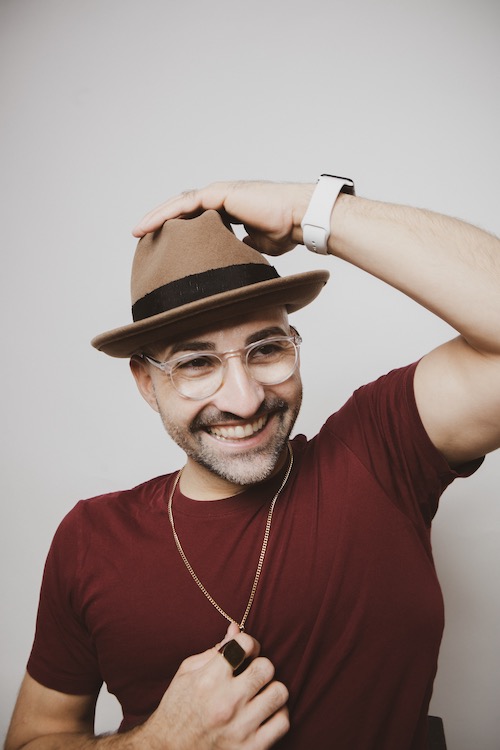
Community Influencer

Alum takes to social media to inspire, uplift, and generate change
by Maggie Regier (Honors ’20)
Spencer West (’03) is a force of nature. He’s summited Mount Kilimanjaro, opened for Demi Lovato’s world tour, published a bestselling memoir, and shared stages with people such as former US Vice President Al Gore, Natalie Portman, and Jennifer Hudson. Last October, he returned to Westminster as the keynote speaker for the Bastian Foundation Diversity Lecture series.
A motivational speaker and disability advocate, Spencer has been leading the way since the age of five, when he lost both legs from the pelvis down. When he’s not gracing keynote stages all over the world, he’s striking up conversations with his 4.5 million followers on TikTok.
Spencer is exceptional at using social media as a tool for making big impacts in the disability community.
“The internet allows disabled folks to take control of the narrative,” he says. “For so long it was non-disabled folks controlling the conversation, and now we’re trying to undo a lot of misinformation.”
Spencer is known for his educational TikToks that are light, bright, and engaging.
“The internet makes the world possible for a lot of people with disabilities,” Spencer says. “When it comes to my content, I try to have some sort of lesson or use my content in a way that I am being visible with my identities.”
Spencer’s content often evokes fun and laughter, but its usual intention is to bring awareness.
“Online I am hoping to create empathy. When you suddenly have a relationship or connection with someone, it is much harder to hate them,” he says. “We may not like everyone, but when we build empathy, it's easier to have respect and understanding.”
Real growth—and the understanding Spencer references—can take place on social media. Intersectionality, the way in which various forms of discrimination combine or overlap, can be used to illustrate how engaging online can create a sense of understanding. The framework for intersectionality, and the language around it, became much more popular through social media, which functions positively by exposing us to people’s truths and identities. This helps people feel seen, understand one another, and build empathy.
“We see how our identities intersect,” Spencer says. “It’s given us language for something we have always experienced but didn’t always know how to articulate.”
According to Spencer, language is a working, living, breathing thing that is always evolving. The evolution of language around the disability community is one example. In the 1980s, “disabled” was a bad word, and “special needs” was the label of choice. Spencer says that as he has gotten older, he has learned his needs aren’t special—he just “wants basic human rights like anyone else.” As we evolve, we learn our histories and understand why certain words don’t work anymore.
Community is at the heart of Spencer’s work. At the Bastian Diversity Series Lecture in October 2023, Spencer urged listeners to start by making positive change in their own communities.
He says that when we are open to making mistakes and willing to apologize, we start to look at the world differently. We can look at our experiences and notice who is there and who isn’t. We start to ask why and what is preventing them from being there, and we have meaningful conversations with our communities.
“The biggest thing I’ve learned in the last four years is to get to know the people in your community,” Spencer remarked during his keynote address. “Check in with them. Make sure they know that you’re there and supportive. Change starts in our own communities; it starts with our families, in our homes, and in our neighborhoods.”
This spirit of listening, learning, and meaningful change is something that so many of us love about Westminster. It was here that Spencer first felt he was in an environment that was safe enough for him to come out as a queer person—an environment that was about so much more than academics: about life and self-discovery.
Listening to: The We Can Do Hard Things podcast
Reading: The Future Is Disabled
Recently listened-to song: Hozier “son of Nyx”
Fave profs: Michael and Nina Vought
Fave memory on campus: Late Night Breakfast/Midnight Breakfast
Go-to spring bev: Aperol Spritz
Spencer’s Tip for Being More Accessible:
Add image descriptions and alt text in photos for people who are blind. Use closed-captioning on videos for people who are deaf. Most importantly, always look at your world through the lens of, “Can everyone access this in some way?”
Follow Spencer on Tiktok: @spencer2thewest
About the Westminster Review
The Westminster Review is Westminster University’s bi-annual alumni magazine that is distributed to alumni and community members. Each issue aims to keep alumni updated on campus current events and highlights the accomplishments of current students, professors, and Westminster alum.
GET THE REVIEW IN PRINT Share Your Story Idea READ MORE WESTMINSTER STORIES